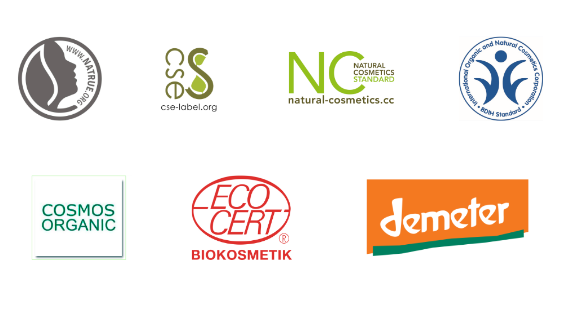What is certified natural cosmetics?
In contrast to the food sector, where the distinction between "organic" and "non-organic" is officially regulated by an EU organic label, there are no legally regulated requirements in the cosmetics sector as to what is meant by natural or organic cosmetics. In order to make genuine natural cosmetics clearly recognisable to you, various natural cosmetics manufacturer associations have therefore been founded to establish uniform standards. This has resulted in various labels, whose standards and differences are explained below. The following aspects are common to all standards:
- raw materials are of plant, animal or mineral origin - components of dead vertebrates are not allowed
- No silicones, paraffins and other petrochemical components
- No synthetic dyes, fragrances or UV filters
- Restriction to nature identical preservatives / No parabens
- No ethoxylated components, like PEG
- No genetically modified organisms, nanomaterials or irradiation
- Production processes are regulated, consideration of Green Chemistry
- Guidelines for misleading labelling and advertising, especially for "organic advertising
BDIH
The natural cosmetics label "BDIH - Kontrollierte Naturkosmetik" is one of the best-known natural cosmetics labels and was already introduced in 2001 by the non-profit association BDIH (Bundesverband Deutscher Industrie- und Handelsunternehmen für Arzneimittel, Reformwaren, Nahrungsergänzungsmittel und Körperpflegemittel e.V.) in cooperation with well-known natural cosmetics manufacturers in order to create a uniform standard for natural cosmetics. Certification is carried out by the IONC (International Organic and Natural Cosmetics Corporation), a globally operating non-profit organisation founded by the BDIH. More than 280 brands or 8,800 products in 27 countries are now certified according to the BDIH standard.
The criteria of the BDIH standard for controlled natural cosmetics comprehensibly define the requirements for natural ingredients in cosmetic products. In addition, nature and animal protection are taken into account as well as important aspects of sustainability. In particular, this means that certain plant raw materials must come from controlled organic cultivation or controlled wild collection. Animal raw materials from dead vertebrates are prohibited, as are most preservatives. The production processes of raw materials are also regulated. A detailed list of the standard can be found at
www.ionc.info_COPY10
COSMOS
The COSMOS standard is a non-profit association of European standard setters for natural cosmetics. The founding members are BDIH (Germany), ECOCERT and Cosmébio (France), ICEA (Italy) and Soil Association (Great Britain). The award criteria are based on those of the original founding organisations, so that a uniform European standard has been created. Basically, a distinction is made between COSMOS natural (without a minimum proportion of organically produced raw materials) and COSMOS organic (at least 95% organic content). From 2017, the COSMOS standard will replace the BDIH standard for all newly certified products. A detailed description of the award criteria can be found at www.cosmos-standard.org
NATRUE
The international non-profit association Natrue, based in Brussels, was founded in 2007 by well-known European natural cosmetics manufacturers. Natrue itself is the standard holder of the label, which is awarded by external certification bodies. The Natrue standard classifies cosmetic products into different product groups, each of which has its own regulations regarding minimum content of natural substances and raw materials from organic farming. In addition, three quality levels are distinguished. The basis is formed by natural cosmetics (criteria similar to COSMOS/BDIH), natural cosmetics with organic content (70% of ingredients from organic farming) and organic cosmetics (95% organic farming).
ECOCERT
The French label Ecocert describes both its own natural cosmetics standard, and Ecocert itself is also a certifier for other labels. Ecocert certification distinguishes between natural cosmetics (at least 50% of the plant raw materials are organic) and organic cosmetics (at least 95% of the plant raw materials are organic). For both variants it applies that at least 95% of the raw materials must be of natural origin. The exact specifications of the standard can be found at www.ecocert.com.
ICADA
The label "ICADA - certified natural cosmetics" was founded in 2009 by the ICADA Association (International Cosmetics and Device Association). The label is awarded exclusively to brands that are positioned in the specialised trade and follows stricter criteria than BDIH/COSMOS and Natrue, the list of approved ingredients is much shorter. Certification is carried out by external certification bodies. You can read about it at
http://zertifizierte-naturkosmetik.eu/http://www.icada.eu/wp-content/uploads/2013/07/Premium-Bio-und-Naturkosmetik-Richtlinie-von-ICADA.pdf
DEMETER
The biodynamic growers' association demeter e.V. awards the demeter seal exclusively to a few cosmetic products such as body care, soap, extracts and extracts. In addition, individual ingredients may be labelled as "demeter", provided the end product meets a different natural cosmetic standard. At least 60% of the cosmetic raw materials as well as the name-giving ingredient must come from demeter cultivation, the remaining criteria are similar to the other natural cosmetic standards, see www.demeter.de
AUSTRIA ORGANIC GUARANTEE AND AGROVET
Austria is the first country worldwide to introduce an official framework for the production and labelling of cosmetics with a reference to organic farming. The award is made according to the criteria of the Austrian Food Codex, the testing by external certifiers. A distinction is made between two standards, organic cosmetics according to Austria-Bio-garantie (at least 95% organic content of agricultural products) and natural cosmetics according to Agrovet (criteria similar to COSMOS/BDIH).
CSE
The CSE Certified Sustainable Economics certification certifies entire companies in terms of sustainability. Developed by the GfaW Gesellschaft für angewandte Wirtschaftsethik in cooperation with Eco-Control and six pilot companies, a catalogue of minimum requirements in the social, ecological and economic fields has been created. These include specifications on working hours, equal rights, transparency, quality management, animal testing and palm oil. For further information, please visit www.cse-label.org
VEGAN
Vegan means that the product does not contain any animal constituents, animal by-products or animal derivatives. Furthermore, the final product and its components are not tested on animals. Certification takes place e.g. by the Vegan society, however only a fraction of all vegan products are actually certified and recognizable as such. We have therefore marked all vegan products in our shop accordingly to make your search easier.

















